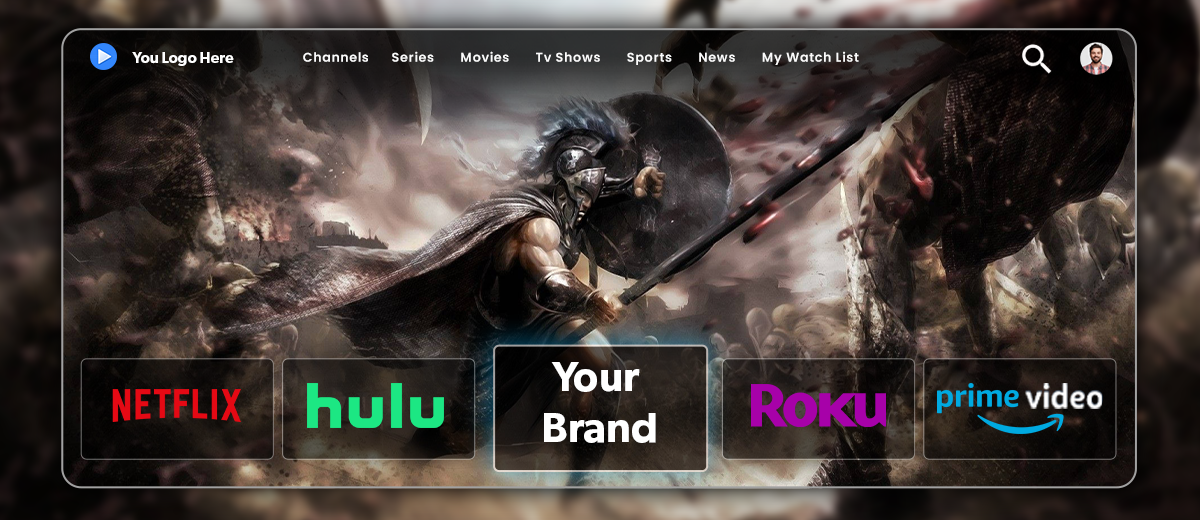Streaming services have taken the world by storm, and it’s no surprise that businesses and content creators are looking to leverage them to expand their reach and audience. However, not everyone has the resources to develop and maintain their own streaming platform. This is where white label streaming services come into play. In this article, we’ll explore what white label streaming services are, their benefits, the different types available, considerations to make when choosing one, and successful case studies.
Introduction
Streaming services have grown exponentially in the last few years, and it’s not just limited to Netflix and Amazon Prime. Live streaming, video on demand (VOD), and audio streaming platforms have become increasingly popular among businesses and content creators. However, not everyone has the expertise or resources to develop and maintain their own streaming platform. This is where white label streaming services come into play.
White label streaming services are pre-built, customizable platforms that businesses can use to create their own branded streaming service. These services allow businesses to offer live streaming, VOD, and audio streaming to their audiences without having to invest in the development and maintenance of a platform from scratch.
Benefits of White Label Streaming Services
There are several benefits of using white label streaming services, including:
Custom Branding and User Experience
White label streaming services allow businesses to create a streaming platform that is fully branded and customized to their needs. This includes customizing the interface, branding elements such as logos and color schemes, and creating a seamless user experience that aligns with their brand.
Greater Control Over Content Distribution and Monetization
With white label streaming services, businesses have full control over their content distribution and monetization. This means that they can choose how their content is distributed, who has access to it, and how they can monetize it.
Improved Scalability and Cost-Effectiveness
White label streaming services offer improved scalability and cost-effectiveness compared to developing and maintaining a streaming platform from scratch. These services are pre-built and can be customized, reducing development time and costs. Additionally, businesses only pay for the features they need, making it a cost-effective solution for streaming needs.
Types of White Label Streaming Services
There are different types of white label streaming services available, including:
Live Streaming platforms
Live streaming platforms allow businesses to broadcast live events to their audience. These platforms come with features such as chat, audience analytics, and live streaming capabilities.
Video on Demand (VOD) Platforms
VOD platforms allow businesses to create and distribute pre-recorded videos to their audience. These platforms come with features such as video hosting, video analytics, and customizable video players.
Audio Streaming Platforms
Audio streaming platforms allow businesses to create and distribute audio content, such as podcasts and music. These platforms come with features such as audio hosting, customizable audio players, and audience analytics.
Considerations When Choosing a White Label Streaming Service
When choosing a white label streaming service, there are several considerations businesses should make, including:
Cost and Pricing Models
White label streaming services come with different pricing models, such as pay-as-you-go or monthly subscription fees. Businesses should choose a pricing model that aligns with their budget and the features they need.
Features and Functionality
Different white label streaming services come with different features and functionality. Businesses should choose a service that offers the features they need, such as customization options, analytics, and monetization options.
Technical Requirements and Support
Businesses should consider the technical requirements and support available when choosing a white label streaming service. This includes the technical specifications needed to integrate the service with their existing systems and workflows and the support available to troubleshoot any issues that may arise.
Integration with existing systems and workflows
Integration with existing systems and workflows refers to the ability of a white label streaming service to seamlessly integrate with the existing software and processes that a business or organization already has in place. This is an important consideration for many companies, as they want to avoid any disruptions to their current operations when implementing a new streaming service.
When considering a white label streaming service, it’s important to ensure that the platform can easily integrate with your existing systems and workflows. This includes everything from your content management system (CMS) and customer relationship management (CRM) software to your billing and payment systems.
The ability to integrate with existing systems and workflows can also help businesses to streamline their operations and improve efficiency. For example, by integrating their streaming service with their CMS, a business can more easily manage their video content and publish it across multiple channels.
Choosing a White Label Streaming Service Provider
Streaming services have become an essential part of our lives. Whether it’s movies, TV shows, or live events, the demand for streaming services has increased tremendously in recent years. With the increasing demand, many businesses have started to offer streaming services, making it difficult to choose the right provider. However, with the emergence of white label streaming services, businesses can now have their own streaming platform without having to invest in building their own infrastructure. In this article, we’ll discuss the factors to consider when choosing a white label streaming service provider, how to research potential providers, and some case studies of successful white label streaming service providers.
Factors to consider when choosing a provider
Choosing a white label streaming service provider is a critical decision for any business. The provider you choose will have a significant impact on the success of your streaming platform. Therefore, it’s essential to consider the following factors when choosing a provider:
Reliability
One of the most important factors to consider when choosing a white label streaming service provider is reliability. Your provider should be able to deliver high-quality streaming without any interruptions or delays. Make sure to check their uptime guarantees and the measures they have in place to handle any potential technical issues.
Customization
Customization is another crucial factor to consider when choosing a provider. Your streaming platform should reflect your brand’s identity and be tailored to your audience’s preferences. Look for a provider that allows you to customize the user interface, branding, and features of your platform.
Scalability
As your streaming platform grows, your provider should be able to scale with you. Look for a provider that can accommodate your growing user base and handle increased traffic without affecting the quality of your streams.
Security
Security is a critical concern when it comes to streaming platforms. Look for a provider that offers robust security features, such as SSL encryption, secure video hosting, and content protection measures.
Pricing
Pricing is an important consideration when choosing a provider. While cost shouldn’t be the only factor, it’s essential to choose a provider that offers a fair pricing model that fits your budget.
Researching potential providers
Once you’ve identified the factors you want in a provider, the next step is to research potential providers. Here are some steps to follow:
Read reviews
Reading reviews from other businesses that have used the provider can give you an idea of their experience. Look for reviews that mention the factors you’re interested in, such as reliability, customization, and scalability.
Check their portfolio
Check the provider’s portfolio to see the types of streaming platforms they’ve created. This can give you an idea of their capabilities and whether they’re a good fit for your business.

Ask for references
Ask the provider for references from other businesses that have used their service. Contact those businesses to get their perspective on the provider’s service and support.
Test their platform
Ask the provider if you can test their platform before committing to their service. This can give you a better idea of their platform’s user interface, features, and overall quality.
Some of the successful white label streaming service providers
Webnexs
There are many white label streaming service providers out there, but what sets Webnexs apart? For starters, Webnexs offers a comprehensive suite of features that make it easy for businesses to get up and running quickly. Their platform is fully customizable, meaning businesses can easily add their own branding and style to the platform. Additionally, Webnexs offers a range of monetization options, so businesses can earn revenue from their content.
Flicknexs
Flicknexs, which is a company that provides white label streaming service solutions. White label streaming services are customizable video streaming platforms that can be branded and customized by businesses to suit their specific needs. Flicknexs provides these solutions to businesses who want to create their own branded video streaming platforms without having to develop their own software from scratch.
Vimeo
Vimeo Livestream is a popular white label streaming service provider that has been used by businesses like TEDx and IBM. With Vimeo Livestream, businesses can create and host their own live events, webinars, and virtual conferences. They offer reliable streaming with no buffering or delays, custom branding, and advanced analytics to help businesses measure their success. Additionally, Vimeo Livestream offers monetization options such as pay-per-view, subscription, and advertising.
DaCast
DaCast is another popular white label streaming service provider that has been used by businesses like PBS and the US Army. They offer secure streaming with SSL encryption and content protection measures. DaCast also offers custom branding and monetization options such as pay-per-view and subscription. Their platform is scalable, meaning it can handle any size audience, from a few hundred to millions of viewers.
Brightcove
Brightcove is a white label streaming service provider that has been used by businesses like Ford and Sephora. They offer secure streaming with DRM protection and HTTPS streaming. Brightcove also offers custom branding and monetization options such as pay-per-view and subscription. Their platform is scalable, meaning it can handle any size audience, from a few hundred to millions of viewers. Additionally, Brightcove offers advanced analytics and integrations with popular marketing tools like Marketo and Salesforce.
These case studies demonstrate the benefits of choosing a white label streaming service provider for businesses. With the right provider, businesses can create a custom-branded streaming platform that meets their unique needs and delivers high-quality streaming to their audience.
Conclusion
In conclusion, choosing a white label streaming service provider can be a great option for businesses looking to create a custom-branded streaming platform that delivers high-quality streaming to their audience. When choosing a provider, it’s important to consider factors such as pricing, features, and customer support. Researching potential providers and looking at case studies of successful providers can also help businesses make an informed decision.



Leave a Reply